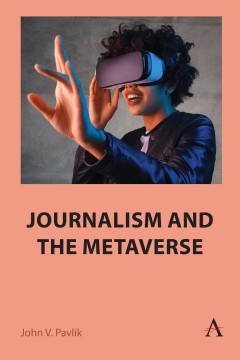Journalism and the Metaverse
By John V. Pavlik
Other Formats Available:
- About This Book
- Reviews
- Author Information
- Series
- Table of Contents
- Links
- Podcasts
About This Book
Journalism has been in a state of disruption since the development of the Internet. The Metaverse, or what some describe as the future of the Internet, is likely to fuel even further disruption in journalism. Digital platforms and journalism enterprises are already investing substantial resources into the Metaverse, or its likely components of artificial intelligence, augmented reality and virtual reality. Although research shows most of the public has little knowledge of the Metaverse, many are keenly interested in what it or its components may bring. Gartner (2022) predicts that a quarter of the public will spend at least one hour per day in the Metaverse by 2026. Journalism may be an important part of this future.
This book will critically examine the nature of the Metaverse and its implications for journalism. In particular, the book will examine how the advance of a broadband, interactive and immersive Internet called the Metaverse may change the content and format of news, the nature of journalistic work, who or what is a journalist, the nature and structure of the new industry and how it is funded, as well as the fundamental role of journalism in a digital society.
In particular, this book builds on a vision of the Metaverse as an immersive and interactive virtual world, a key development in the next generation of the broadband, publicly accessible Internet. Broadband means high-speed, high-bandwidth Internet connectivity, especially wirelessly. Immersive refers to enveloping, 3D forms of media and communication. Today, we often see immersive media in the form of augmented reality (AR) or virtual reality (VR) or other forms of what are labeled extended Reality (XR). Fueled by artificial intelligence, these forms are three dimensional (3D), they have depth and they surround the user in a 360 virtual world visually and aurally (and potentially via other senses, including the haptic). Interactive means both user-to-user engagement (e.g., social media) as well as an exchange between the user and the enveloping content experience of a virtual world. This book will examine the implications of the Metaverse for journalism in four broad domains, including content, how journalists work, structural and systemic considerations, and user and public engagement with news.
Reviews
Author Information
John V. Pavlik is professor of journalism and media studies in the School of Communication & Information at Rutgers, the State University of New Jersey.
Series
Table of Contents
Introduction; 1. Disrupting Journalism: Setting the Parameters of the Metaverse; 2. Principles of Journalism in a Virtual World: Ensuring the Pursuit of Truth; 3. Structural and Systemic Considerations in the Metaverse: Regulations, Economics, and Newsroom Organization; 4. Metaverse Reporting: Looking Inside and Out; 5. Journalists as Avatar: Evolving toward a Hybrid Model of Human and AI Reporters; 6. Users of the Metaverse: A Virtual Public; 7. Research on XR-Based Journalism: Designing News for the Metaverse; 8. Concluding Reflections: Achieving Journalistic Excellence in the Metaverse; References; Index
Links
Stay Updated
Information
Latest Tweets



